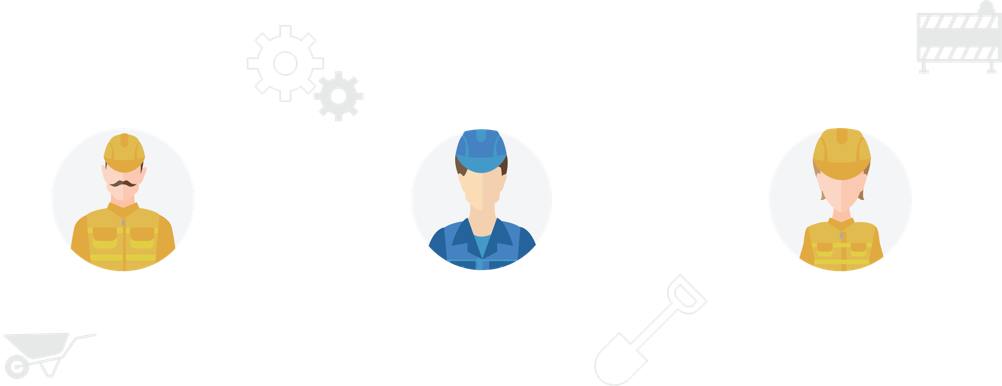
Metal Fabricators (Fitters) make and repair parts used in the construction of buildings, bridges, tanks, towers, boilers, pressure vessels, and other structures. They lay out, cut, and fabricate structural steel, plate, and different ferrous and non-ferrous metals used in the manufacturing and construction industries.
Job Related Skills, Interests and Values
- Setting up and operating trade machinery including brake presses, shears, plasma cutters, oxy-fuel cutting torches, grinders, and drills to bend, punch, cut, and form metal components
- Reading and interpreting blueprints, drawings, and schematics
- Performing calculations and applying shop formulas and other mathematical methods to develop patterns and lay out structural steel
- Planning the sequence of tasks and deciding how to cut the steel most efficiently
- Assembling/fitting metal sections and plates together to form units used in assembly process
- Fastening components together using tack welding, bolting, and riveting
- Safely moving assemblies using material handling, rigging, hoisting, and lifting equipment
What Preparation and Training Do You Need?
- Grade 10 the legal minimum; employers usually require secondary school diploma
- Credits in technical math and shop assets
- Completion of a 4,680-hour on-the-job apprenticeship and 5,400 hours of in-school training
- Exam to obtain Certificate of Qualification
What's Your Future as a Metal Fabricator (Fitter) (437A)?
- Full-time, sometimes in shifts; generally indoors in fabricating shops or factories
- Welding certificate increases employability; important to keep up with new technologies
- Employers include welding companies; manufacturers of structural steel, boilers, heavy machinery, and transportation equipment; mining and oil/gas companies
Wage Rate
Apprentice wage increases with skill and experience. Fully qualified workers earn an average of $27.00-$40.00 per hour.
Self-Rating
Metal Fabricator (Fitter) (437A)
| Ask Yourself: | Yes | No |
|---|---|---|
| Can you look at a diagram or shop drawing and visualize in 3 dimensions how things should come together? | ||
| Are you detail-oriented and enjoy working with your hands? | ||
| Can you lift 50lbs comfortably? Are you able to travel for work? | ||
| Are you able to follow Health & Safety guidelines? | ||
| Do you have a mechanical aptitude for fixing things and good manual dexterity? | ||
| Are you good at performing mathematical calculations? | ||
| Do you have excellent time-management skills? Are you an organized person? |
If you checked YES to the majority of these questions, a career as a Metal Fabricator (Fitter) (437A) may be for you!
You might want to look at these similar trades as well;
- Millwright
- Sheet Metal Worker
- Welder
- Machinist
- Tool and Die Maker
- Boilermaker
Pressure systems welders use shielded metal arc welding, gas metal arc welding, gas tungsten arc welding and flux cored arc welding processes to weld metal plates, tubes, and other structures in boilers and other pressure systems. They cut pipes and tanks and assemble these pieces, and may have to repair defective welds in boilers and pressure systems.
Elevating Devices Mechanics may inspect, install, maintain, service, and repair elevating devices. Such devices can include passenger elevators, freight elevators, observation elevators, dumbwaiters, escalators, moving walkways, freight platforms, stage lifts, and others.
Tool & Gauge Inspectors inspect, test, and adjust new and reworked tools, dies, jigs, fixtures and gauges. To become a Tool and Gauge Inspector, you are likely already working as a Tool & Die Maker.
Sheet metal workers fabricate, assemble, install, and repair sheet metal products.
Construction Boilermakers build, repair, test, and maintain all types of boilers, tanks, and pressure vessels. They also perform all types of structural and plate work on dust, air, gas, steam, oil, water, and other liquid-tight pressure vessels. Work may occasionally be done on scaffolds to repair and maintain existing boilers.
Light Rail Overhead Contact Systems Linepersons help ensure that light rail transit systems are working correctly. They are responsible for building and maintaining lighting systems, electrical track switch systems, contact conduct systems, and aerial feeder systems. This could mean working with any of the parts or equipment involved in the creation and maintenance of a light rail system, including conductors, switches, transducers, air compressors, track gauges, hydraulic presses, voltmeters, ammeters, puller-tensioner machines, and hoisting equipment.
General Machinists are skilled craftspeople who set up and operate precision metal cutting and grinding machines including lathes, milling machines, drills, shapers, boring mills, and grinders. They may use equipment to manufacture, install, operate, adjust, and repair machine tools and other machines in common use.
Railway Car Technicians ensure that trains, streetcars, and subway trains are working correctly. They are responsible for inspecting passenger and freight cars for damage and making necessary repairs. This means working with any of the parts involved in the inner/outer works of a rail car, including compressors, air valves, piping, air cylinders, passenger seats, windows, and washrooms.
Industrial Mechanic Millwrights install, maintain, repair, and remove stationary industrial machinery, mechanical equipment, and automated and robotic systems. They most often carry this work out in industrial plants and factories.
Tool & Die Makers are skilled craftspeople that make, repair, and modify custom-made, prototype, or special tools, dies, jigs, fixtures, and gauges to very specific and precise dimensions. The work involves the operation of lathes, grinders, and milling and boring machines.